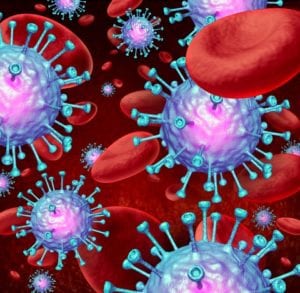Immunotherapy for Peritoneal Mesothelioma: New Drug Trial Begin
 Researchers in Maryland and Missouri have started human testing of a new type of immunotherapy for peritoneal mesothelioma. If the human trial of this new CAR T-cell therapy goes as well as the laboratory tests, this could be good news for many people with asbestos cancer.
Researchers in Maryland and Missouri have started human testing of a new type of immunotherapy for peritoneal mesothelioma. If the human trial of this new CAR T-cell therapy goes as well as the laboratory tests, this could be good news for many people with asbestos cancer.
CAR stands for chimeric antigen receptor. CAR T-cell therapy works by “reprogramming” a patient’s immune system to fight cancer cells.
Tests show this therapy can work well for blood-based cancers like leukemia. But the results have not been as good for solid tumors like peritoneal mesothelioma.
MaxCyte is the American company than makes the new drug. They are hoping that their approach to immunotherapy for peritoneal mesothelioma will be better.
Preparing CAR T-cell Therapy
The Phase I clinical trial will test a drug called MCY-M11. MCY-M11 finds cancer cells in the body by looking for a protein called mesothelin. Mesothelioma cells and other types of cancer cells produce more mesothelin than normal cells do.
The trial will also be a test of MaxCyte’s special system for preparing CAR T-cell therapy. The company says the system, called CARMA, is faster and more efficient than other CAR T-cell preparation methods.
“The initiation of patient dosing in our first clinical trial with our lead CAR therapeutic candidate is a significant milestone for MaxCyte, validating our streamlined manufacturing process for clinical use,” said MaxCyte CEO Doug Doerfler.
Tests Will Focus on Immune System
Doctors will give MCY-M11 to the test subjects directly into their abdomen. MCY-M11 “reprograms” cancer cells using tiny pieces of messenger RNA.
MaxCyte says the messenger RNA method is safer than virus-based CAR T-cell therapy. Although the effects do not last as long, normal cells are less likely to be effected and mesothelioma patients are less likely to have serious side effects.
With this type of immunotherapy for peritoneal mesothelioma, patients will get repeated doses of MCY-M11. This will help maintain the cancer-fighting effects. Doctors will monitor the patients closely to decide on the safest effective dose.
About the Immunotherapy Trial
The National Cancer Institute is sponsoring the Phase I clinical trial of MCY-M11. The two enrollment sites are the NIH in Maryland and Washington University in St. Louis.
Fifteen patients with ovarian cancer or recurrent peritoneal mesothelioma will take part. Only patients with cancer that has come back after chemotherapy are eligible for the trial.
“Individuals with advanced and relapsed ovarian cancer or peritoneal mesothelioma have limited effective therapeutic options today,” says MaxCyte’s Chief Medical Officer Dansky Ullmann, MD. “MCY-M11 is an exciting new approach with the potential to improve outcomes for these patients.”
Peritoneal mesothelioma happens in the abdomen. Like pleural mesothelioma, it involves the lining around the internal organs and is caused by asbestos. About a fifth of the 2,500 mesothelioma diagnoses in the US each year are peritoneal mesothelioma.
Sources:
“MaxCyte Commences Dosing in First Clinical Trial in Solid Tumors”, October 10, 2018, MaxCyte website, https://www.maxcyte.com/maxcyte-commences-dosing-in-first-clinical-trial-in-solid-tumors/
“Intraperitoneal MCY-M11 (Mesothelin-targeting CAR) for Treatment of Advanced Ovarian Cancer and Peritoneal Mesothelioma”, https://clinicaltrials.gov/ct2/show/NCT03608618





